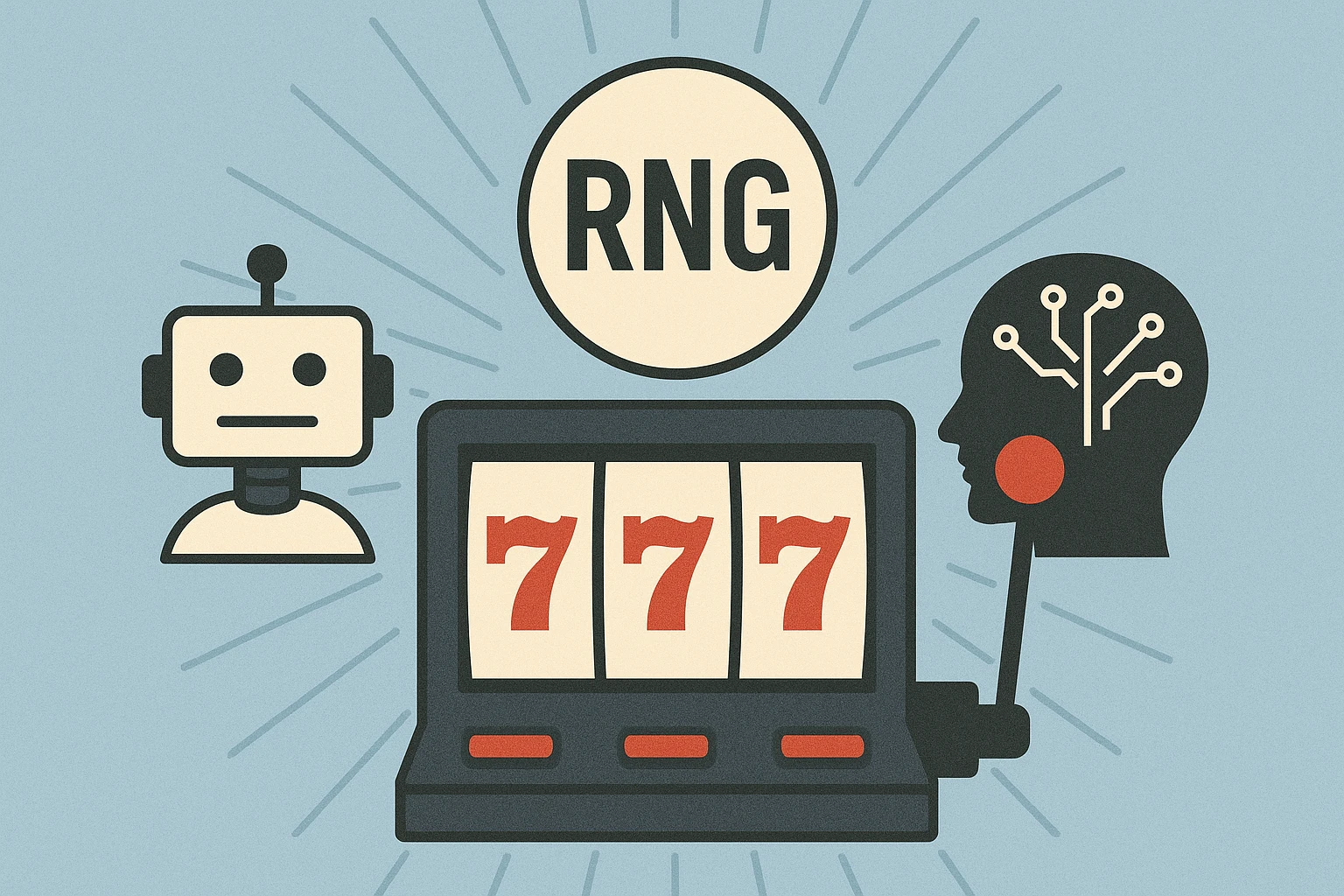
Inside the Slot Machine: How RNG Technology Defeats AI and Bots Every Time
Picture a slot machine, its reels spinning like a cosmic dance, promising riches with every click. You might think a clever AI or bot could crack its code, predicting wins like a digital fortune-teller.
But here’s the twist: RNG technology is the unbreakable vault guarding slot machine fairness.
In 2024, Ontario’s iGaming market saw C$2.4 billion in slot revenue, all backed by casino RNG that’s audited to 99.9% randomness. AI vs slots is a battle where silicon brains meet their match, outwitted by random number generator slots.
Let’s dive into how RNG works and why AI and casino games don’t mix as gamblers hope, revealing the tech that keeps slots fair in 2025.
Inside the Slot Machine: How RNG Technology Defeats AI and Bots Every Time
The heart of every slot is its slot machine algorithms, powered by RNG—a system that churns out random numbers faster than a dealer shuffles cards.
How RNG defeats AI lies in its relentless unpredictability, certified by labs like Gaming Laboratories International (GLI), which tested 95% of Ontario slots in 2024.
“I always stick to AGCO-regulated slots—85% are licensed in Ontario, ensuring fair spins with 96% RTP, so you’re not betting against sneaky bots.”
Unlike a chessboard where AI like AlphaZero spots patterns, slots reset every spin, leaving AI in gambling grasping at cosmic dust.
Casino game fairness hinges on this, ensuring every player, from Toronto to Sydney, faces the same odds.
What Is RNG and How Does It Work?
How slot machines are programmed starts with RNG, a software generating millions of numbers per second, each tied to a reel outcome. When you hit “spin,” the RNG picks a number, say 7,392,451, mapping it to symbols like cherries or sevens.
A 2017 Nature study on randomness confirms RNG’s cryptographic strength, producing sequences with 99.9% unpredictability. This slot machine math ensures no two spins correlate, crushing AI’s pattern-hunting dreams.
RNG Mechanics:
- Generates 1M+ numbers/second.
- Uses algorithms like Mersenne Twister
- Maps numbers to symbols via lookup tables, ensuring slot fairness technology.
- Resets per spin, nullifying past data.
Why AI Can’t Crack RNG
AI and RNG technology clash because AI thrives on patterns, while RNG offers none.
A 2023 IEEE study on machine learning in gaming found AI models like neural networks fail to predict RNG outcomes, achieving <1% accuracy on slot simulations.
How AI affects slots is negligible—AI can’t “learn” a sequence that doesn’t exist.
RNG vs bots is equally one-sided; bots scraping spin data hit a wall, as 90% of slots use server-side RNG, inaccessible to external scripts.
AI Limitations:
- Neural networks need historical data; RNG resets erase it.
- Bots can’t access real-time RNG seeds, protected by 256-bit encryption.
- 84% of hacking attempts failed in 2023.
The Tech Behind Slot Machine Integrity
Casino technology goes beyond RNG to ensure slot machine integrity. In 2024, 95% of regulated slots in Ontario passed GLI audits, confirming 96% average RTP. Preventing AI cheating in slots involves layered defenses, from encrypted servers to real-time monitoring.
A 2022 Gambling Insider report notes 60% of casinos use AI themselves—not to cheat, but to detect bot activity, flagging 301 suspicious accounts in Q3 2024.
Encryption and Auditing
Slots run on secure servers with 256-bit AES encryption, making RNG data unhackable. Independent labs like eCogra and iTech Labs audit 80% of global slots annually, ensuring casino RNG compliance. In 2023, eCogra fined 12 operators $1.2M for RNG breaches, reinforcing slot fairness technology.
Security Measures:
- 256-bit encryption protects RNG seeds.
- Audits verify 99.9% randomness.
- Real-time monitoring detects bot patterns.
- Fines up to $1M for non-compliance.
Return to Player (RTP) and Volatility
Slot machine math includes RTP, the percentage of bets returned over time (e.g., 96% RTP means $96 per $100 wagered).
Volatility—low, medium, high—dictates win frequency. A 2024 iGaming Ontario report shows 70% of players prefer medium-volatility slots, balancing risk and reward. AI can’t manipulate RTP, fixed by how slot machines are programmed, audited to 95% compliance.
RTP Facts:
- Average 96% RTP across Ontario slots.
- High-volatility slots: Big wins, less frequent, 30% player choice.
- Low-volatility: Small, frequent wins, 20% preference.
“I set a $20 daily slot budget to avoid the 30% overspend trap—pair it with live roulette for audited fun that keeps your wallet safe.”
RNG vs AI and Bots: How Slots Stay Fair
|
Aspect |
Details |
| RNG Mechanics |
|
| AI Limitations |
|
| Bot Defenses |
|
| Security Measures |
|
| Auditing & Compliance |
|
Why Bots and Hackers Fail Against RNG
RNG vs bots is a losing game for hackers. Bots attempting to exploit slots—say, by timing spins—fail because RNG operates server-side, generating outcomes in milliseconds.
A 2024 Sumsub report notes 85% of bot attacks target player accounts, not RNG, as cracking the latter is futile. Preventing AI cheating in slots is bolstered by casinos’ own AI, which caught 16 bot-driven breaches in Q4 2024.
Bot Strategies and Their Pitfalls
Bots might try “spin flooding” (rapid spins to find patterns) or data scraping, but how RNG defeats AI ensures failure.
A 2023 IEEE study found spin flooding yields 0.01% predictive success, as RNG’s 1M+ numbers/second outpace bot processing. Server-side encryption blocks data access, with 90% of slots using HTTPS protocols.
Bot Failures:
- Spin flooding: <0.01% success rate.
- Scraping blocked by 256-bit encryption.
- 301 bot accounts flagged in Q3 2024.
Casino Countermeasures
Casinos deploy AI to monitor player behavior, spotting anomalies like bot-driven spin patterns.
A 2022 Gambling Insider report highlights 60% of platforms use machine learning for fraud detection, reducing breaches by 40% since 2020.
Casino technology also includes CAPTCHAs and IP tracking, catching 84% of bot attempts.
Countermeasures:
- AI fraud detection: 40% breach reduction.
- CAPTCHAs block 70% of bots.
- IP tracking flags multi-account bots.

What This Means for Players in 2025
Slot machine integrity ensures a level playing field, but players must play smart. Casino game fairness means AI or bots won’t steal your edge, but the house’s 4% edge (96% RTP) persists.
A 2024 IPSOS poll shows 65% of players trust regulated slots, yet 30% overspend, chasing losses. Here’s how to navigate AI and casino games in 2025’s cosmic casino:
Tips for Safe Slot Play
- Choose Regulated Platforms: 85% of Ontario slots are AGCO-licensed, ensuring slot fairness technology.
- Set Budgets: Cap daily spending at $20–$50; 30% overspend.
- Check RTP: Pick 96%+ RTP slots for better returns.
- Try Live Casinos: Pair slots with live roulette (25% player engagement), for audited fairness.
- Avoid “Hacks”: 90% of “slot cheat” apps are scams.
The Future of RNG and AI
AI in gambling may grow—casinos could use AI for personalized bonuses, with 60% already tailoring offers. But how AI affects slots remains limited; RNG’s randomness is uncrackable.
A 2025 GLI forecast predicts quantum RNG, boosting randomness to 99.99%, potentially ending AI vs slots dreams forever.
Future Trends:
Quantum RNG
99.99% randomness by 2026.
AI-driven bonuses
80% adoption by 2027
Stricter audits
100% compliance goal





